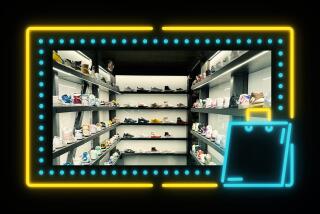Service With a Smile Is Not Always Good Enough : Relationships: In some lines of work, communication is key to alleviating customer resentment.
- Share via
It happened nearly 15 years ago, but Gwen Stewart still turns crimson as she tells the story.
“I took my car to the shop for a simple, garden variety tune-up because I was leaving for San Francisco and wanted to make sure everything was in good shape” recalls Stewart, who lives in Orange. “I was quite proud of myself for being so responsible.”
Her strategy, however, backfired big time.
“There I am, tooling down the 101, when my engine blows,” Stewart remembers. “All of a sudden, I had no power. My car, which until then had run like a champ, was dead. The entire engine had to be replaced. I had no recourse (later) because the guy who did the tune-up went out of business the day after he worked on my car.”
She thinks he was responsible for the problem, and as a result, she says, “I’ve been suspicious of mechanics ever since.”
Gwen Stewart is not alone--and Jack Hargrave knows it.
Even though Hargrave, who owns the Foreign Affair in Santa Ana, gets most of his business through referrals, he says he knows most people don’t like or trust mechanics. It’s an occupational obstacle that he--and many others who provide products and services to the public--must overcome every time they meet a new customer or client.
“I know that when people are standing in the lobby of my shop they wish they weren’t here,” Hargrave says. “It makes them feel vulnerable. When your car is up on the hoist, and the mechanic’s telling you what you need to have done, you feel out of control. No matter how reputable their mechanic is, most people are going to feel a little uncomfortable.”
Hargrave, who lives in Irvine, says the way people perceive him often relates directly to the total on their repair bill.
“If they bring their car in for what turns out to be a little problem, I’m a hero,” he says. “If it turns into a big repair, I’m the bad guy. I didn’t make the car; I didn’t sell it; I didn’t buy it, and I didn’t drive it. But when it doesn’t run, it’s my fault. People need to blame someone, and I’m the most convenient target.”
Hargrave, who has specialized in servicing Honda, Toyota, Nissan and Mazda cars and trucks since opening his shop 11 years ago, says a sense of humor and good people skills are at least as important as the ability to put an engine back together.
“I like to say that I’m not in the car repair business, I’m in the people business,” Hargrave says. “And it’s true. Anyone can fix a car. But if I can’t keep my customers happy, they won’t bring me any cars to work on.”
Stewart, who’s taken her Honda Accord to the Foreign Affair for eight years, says Hargrave succeeds by “shooting straight” and keeping her informed.
“He levels with me, and I like that,” Stewart says. “The news isn’t always good, and I still wish I didn’t have to pay to have my car work done. But it’s a lot easier to reach for the checkbook when you feel that you’ve been dealt with honestly and fairly.”
Hargrave says he’s learned through experience that communicating clearly--and frequently--is the best way to keep customers happy and to avoid what he calls “five o’clock problems.”
“The more they know, the better off I am,” Hargrave says.
Even though the law requires that he show customers the old parts, he says he spends time explaining why they needed to be replaced. “When they know what they’re paying for, it’s a lot easier for people to drive away without feeling a sense of resentment.”
Hargrave says another customer service strategy he learned long ago is to come in under the estimate, if only by a few dollars.
“If I quoted a job at $200 and it ends up running $205, I’ll shave 10 bucks labor off the bill so that it comes in below the estimate. Some people might say that’s bad business, but in the long run it pays off because it keeps customers happy. That’s how you build relationships.”
Ticket broker Megan Hodges knows that many of her customers have mixed emotions when they call Megan’s Tickets in Irvine.
“It’s a love-hate sort of relationship,” says Hodges, 34, who opened her ticket agency in 1982. “People love the fact we can get them excellent seats to any event, but they often resent paying for them.
“I had one Deadhead (a Grateful Dead fan) buy a great $25 ticket to a show for $45. The show was sold out, but we were able to get him what he wanted. When I explained why the ticket had a mark-up, he shook his head and said, ‘Karma, man. Karma’s gonna get you.’ People forget that this is a business, and that the service we provide has value.”
Hodges says educating customers is an ongoing process.
“Some people see what we do as glamorous,” she says.
“They have this notion that we go to every concert and that we always sit in the front row. But the reality is that it’s a pressure business. We deal in a perishable product. The day of the show, a Madonna ticket may be worth $400. But the next morning, it’s just a piece of paper. You’re always racing the clock, and you’re constantly dealing with changing demands.”
Hodges says she tries to diffuse any resentment customers may feel by explaining how she acquires the tickets she resells.
“A lot of people think we have great connections and get all the good seats before they go on sale,” Hodges says. “I wish that were true. In fact, we own season tickets and we network with hundreds of season ticket holders at venues all over Southern California. When someone sells us a $30 ticket, we usually pay a premium ourselves. People assume that we make a huge profit, but they overlook the costs involved in acquiring tickets and running a business.”
Hodges says that once she explains what goes into making premium tickets available, most people are usually much more open to paying for the service she provides. But when they’re not, she understands.
“We’re dealing in a luxury item,” Hodges says. “We’re not selling milk to babies, and no one’s holding a gun to anyone’s head. If people don’t want to pay what we consider a fair price, I understand that. I have to buy every ticket I sell, and there are times when I say, ‘It’s just not worth that much.’ So when a customer says the same thing, I can relate.”
Jack Boatman Jr. is literally in people’s faces all day. And as he drills, picks, polishes and sands, the San Clemente dentist does so with the knowledge that at that given moment, most of his patients would rather be anywhere else than in his chair. He knows that for many, what he does is a necessary evil.
“Even if they have a dentist they love, most people don’t look forward to going,” says Boatman, who began his practice in 1980. “I don’t much like getting fillings myself, so I appreciate where they’re coming from.”
The secret, Boatman says, is not to take a patient’s anxiety personally.
“You have to remind yourself that their fear is usually the result of a bad experience, and that it has nothing to do with you,” Boatman says. “If you don’t keep that in perspective, the stress can really do you in.”
Boatman, 40, says he’s found the best way to deal with a patient fears and phobias is to confront them directly.
“It’s really important for patients to get their feelings out in the open,” Boatman says. “Some patients will say, ‘Nothing personal, but I really hate this.’ But more often than not, they just keep it inside. You pick up their anxiety through their body language, though. You feel it. Rather than letting it simmer, I’ll usually say something like, ‘You’re not real excited about being here, are you?’ It helps break the ice.”
Boatman says such conversations help patients relax because it allows them to see him as a real person with feelings, rather than as a stranger in a white coat.
“When a patient can relate to me as a person and talk freely about their concerns, it makes it more comfortable for them and for me,” Boatman says. “Instead of turning me into the bad guy, it helps them to see me as someone who’s here to help them.”
Boatman agrees with Hargrave and Hodges that clear, open communication is vital.
“I always try to let the patient know what needs to be done, why, and how they can expect it to feel. That little bit of information makes their visit--and my job--a whole lot easier. It eliminates the fear of the unknown.”
The other key to not letting patient anxiety get the best of him, Boatman says, is staying physically active and unloading some of his own stress at the end of the day.
“I try to work out at least three or four days a week,” Boatman says. “It shifts my focus away from the office and helps me relax. Dealing with anxious people gets your own adrenaline pumping. You need a healthy way to release it.”
At the gym, Boatman says, he occasionally runs into an aerobics instructor who happens to be one of his patients.
“We joke about the fact that she’d rather not come to me and I’d rather not go to her. We both do it because the end results are worth it. But I do tease her. I tell her the pain she puts me through during aerobics is far worse than anything she could ever experience in my chair.”






